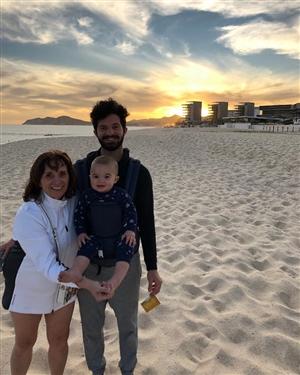Lung surgery saved her life

Marilynne Rose was shocked when a routine cardiac CT scan revealed a large growth on her lung. The 62-year-old resident of Haverford, Pennsylvania, was an avid golfer and professor of interior design at Drexel University—and a nonsmoker.
Marilynne was referred to Main Line Health for further evaluation. Results from a PET scan were inconclusive, but the size of the nodule suggested it was cancer. She needed surgery to find out. “The last thing I expected to hear was that I might have lung cancer,” says Marilynne. “I don’t smoke, and I had no symptoms.”
One operation
Patrick Ross, MD, PhD, a thoracic surgeon at Main Line Health, performed Marilynne’s minimally invasive surgery. While she was under anesthesia, he inserted a camera and robotic arms through four small incisions in her chest. After he removed a wedge of her lung tissue that contained the suspicious growth, the pathology lab took only 15 minutes to confirm that it was cancer. Accordingly, Dr. Ross removed the whole lobe and all nearby lymph nodes to complete the operation. Post-op testing confirmed the cancer was stage 1, meaning that it had not spread, and Marilynne did not need any chemotherapy or radiation.
Dr. Ross diagnosed, treated and staged Marilynne’s cancer, all in one operation. “Older lung surgery techniques required long incisions from the front of the chest to the back and spreading the ribs,” says Dr. Ross. “With the minimally invasive approach, patients have significantly less pain, which makes it easier for them to breathe deeply and cough, helping to prevent complications like pneumonia. Patients recover faster and return to their usual activities sooner.”
Full tumor removal with robotic surgery allows for accurate staging to identify which patients will need more treatments after surgery, Dr. Ross adds.
Cancer survivor and thriver
“My lungs feel good: Even though I’m missing a lobe, I don’t notice it,” says Marilynne. “Swimming has also helped me overcome the shock of my cancer diagnosis and the fear that it might come back.”
Like many people diagnosed with cancer unexpectedly, Marilynne was anxious with every follow-up scan. One day, Dr. Ross told her that the day her cancer was treated she became a cancer survivor, and she needed to live her life as if she were cancer-free.
“That advice was very helpful. It took a while to get over the shock and depression of having cancer,” says Marilynne, who retired six months after surgery. “With cancer, there are lots of unknowns, but Dr. Ross always took time to explain things. I feel incredibly lucky to be in the Main Line Health system, where I received the best care in the world. Dr. Ross and his team saved my life.”
Advances on the horizon

Main Line Health serves patients at hospitals and health centers throughout the western suburbs of Philadelphia. To schedule an appointment with a specialist at Main Line Health, call 1.866.CALL.MLH (225.5654).
 Content you want, delivered to your inbox
Content you want, delivered to your inbox
Want to get the latest health and wellness articles delivered right to your inbox?
Subscribe to the Well Ahead Newsletter.
